The roles of Vitamin B Group
This is the roles of Vitamin B Group
SE Youn
2/16/202511 min read
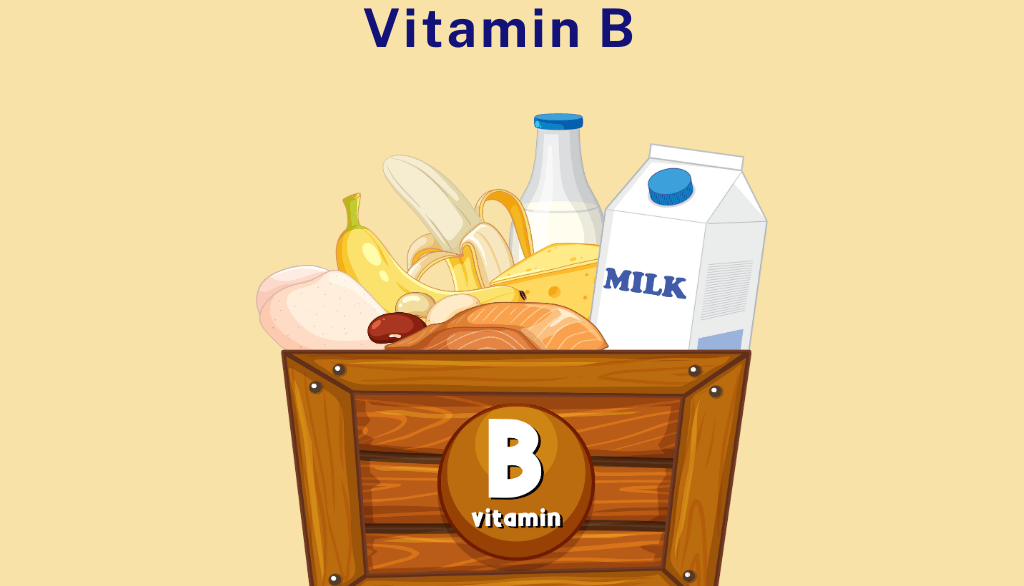

Introduction
B vitamin is an ingredient that allows the body to use energy. It is made up of eight groups, not one type.
B1 vitamin (also known as thiamine), B2 (riboflavin), B3 (niacin), B5 (pantotensic acid), B6 (pyridoxal phosphate), B7 (biotin), B9 (folic acid or folate), and B12 (cobalamin) (commonly known as b vitamin complex) help us form red blood cells and work with enzymes to create energy in the foods we eat. B vitamin plays an important role in releasing energy from carbohydrates, fats, and proteins. B vitamin group can help lower bad cholesterol (LDL) and increase good cholesterol (HDL) while reducing the risk of heart disease.
A lack of B vitamins can lead to anemia or a lack of healthy red blood cell counts. A simple blood test or urine test can determine if you are deficient in B vitamins, so if you feel dizzy, we recommend getting tested.
Because a large proportion of B vitamins come from animal sources, many vegans are deficient in B vitamins, and the only way to meet the recommended daily intake is through supplements. Your doctor can advise you on how much vitamin supplement you need.
All B vitamins are water-soluble, so they are absorbed by the body and ready for immediate use. Because these nutrients are eliminated through urine, they need to be replenished constantly. (Fat-soluble vitamins such as A, D, E, and K are soluble in fats After that, it is absorbed into the tissues and can be taken according to the physical situation.)
According to the National Institutes of Health, they provide Dietary Supplement Fact Sheets detailing the recommended daily intake and the food sources that provide it. All B vitamins can boost energy levels, but there are other surprising benefits as well.
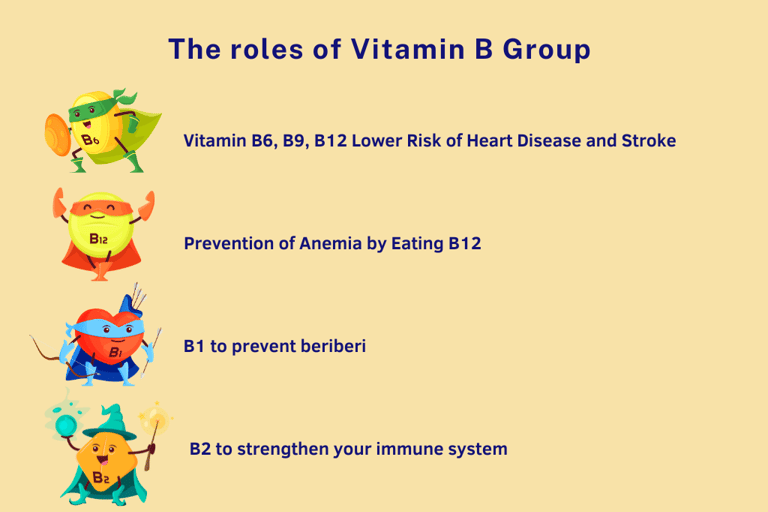

1. Vitamins B6, B9, and B12 may lower the risk of heart disease and stroke
Along with B12 and B9, B6 is said to promote heart health. B vitamins help improve blood circulation by helping to produce new red blood cells that deliver oxygen to the body's tissues and organs.
A 2019 study in Nutrients surveyed 9,000 South Korean men about their food intake and found that increased B6 intake was associated with a reduced risk of heart disease. In another analysis, published in 2018 in Critical Reviews of Food Science and Nutrition, researchers reviewed 11 prior studies on coronary heart disease risk associated with B vitamins and concluded that higher levels of folic acid and b6 vitamin were associated with a lower risk of heart disease. The study included more than 5,000 cases of heart disease.
According to Harvard University, foods rich in B6 include beef liver, tuna, salmon, poultry, and chickpeas, as well as fruits and vegetables such as dark leafy greens, bananas, papayas, oranges, and melons.
B vitamins have also been linked to a lower incidence of stroke. In a review published in Neural Degeneration Research in 2021 and a study involving more than 5,000 older adults (60 years of age and older), researchers found that low b12 vitamin levels were associated with a higher risk of ischemic stroke. An analysis published in Stroke and Vascular Neurology in 2018 found that taking vitamins B9, B12, and B6 lowered blood homocysteine levels by about 25% and reduced the overall relative risk of stroke by about 10%.
"Vitamins B12, B6 and folic acid are important for keeping blood vessels healthy and preventing the buildup of a substance called homocysteine in the blood," says Dr. Venuka Wick, clinical assistant professor in the Department of Family Medicine at the UW School of Medicine in Seattle. "High levels of homocysteine can damage blood vessels and increase the risk of blood clots, which can lead to stroke."
Some studies suggest that B3 [niacin] may help improve cholesterol levels and reduce the risk of cardiovascular disease.
It would be great if a balanced and healthy diet would allow for daily intake of B vitamins, but if the patient is determined to have a deficiency based on the advice of a professional, they may recommend taking nutritional supplements to improve their levels.
However, taking too many certain vitamins can be harmful, so take them under the guidance of a healthcare professional.
2. Avoid anemia with B12
B12 vitamins are essential for the formation of blood cells and the maintenance of healthy nerve cells in the body. If you don't have enough red blood cells, your tissues and organs won't get enough oxygen, and you may develop anemia (a lack of healthy red blood cells) and feel tired and weak. Other symptoms of B12 deficiency include constipation, weight loss, loss of appetite, rash, shortness of breath, diarrhea, tingling or burning sensation in the hands or feet, chapped lips or mouth sores, and mood swings.
"The best way to tell if you are deficient is with a blood test, but many people who are deficient in B vitamins report severe fatigue and lack of energy even before their blood results are available," says Kaufman. "In some severe cases, vitamin deficiencies can cause severe nausea or vomiting."
You can get more B12 from your diet like products, fish, meat, and especially beef liver and shellfish.
3. Increasing your b vitamin1 intake may help prevent beriberi
B1 vitamin plays an important role in metabolizing food into energy. B1 is found in whole grain cereals, yeast, beans, nuts, and meat. Too little B1 leads to beriberi, a disease that affects the heart, digestive system, and nervous system. Beriberi is found not only in malnourished people, but also in people who drink a lot of alcohol. Symptoms of beriberi include difficulty walking, loss of sensation in the hands and feet, and numbness in the legs, which can lead to congestive heart failure.
Taking one of the B vitamins for long periods of time can lead to an imbalance of the other important B vitamins, so a b vitamin complex that contains all of them may be the best option.
4. Boost your immune system with B2 vitamin
B2 vitamin, also known as riboflavin, has a strong antioxidant effect, allowing the immune system to function properly.
Antioxidants destroy "free radicals," unstable molecules that can increase the risk of cancer and other diseases, According to the National Cancer Institute in the United States. A 2015 laboratory analysis of macrophages (cells that play an important role in immunity) published in the Journal of Physiology and Pharmacology showed that riboflavin deficiency inhibited a proper immune response, while riboflavin enrichment reduced inflammation.
B2 can also improve the body's ability to produce antibodies, which are proteins that help fight various infections and protect against future infections.
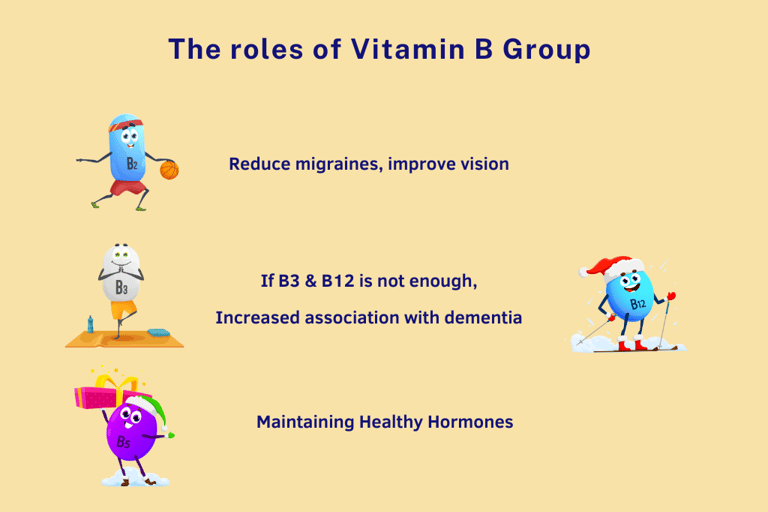

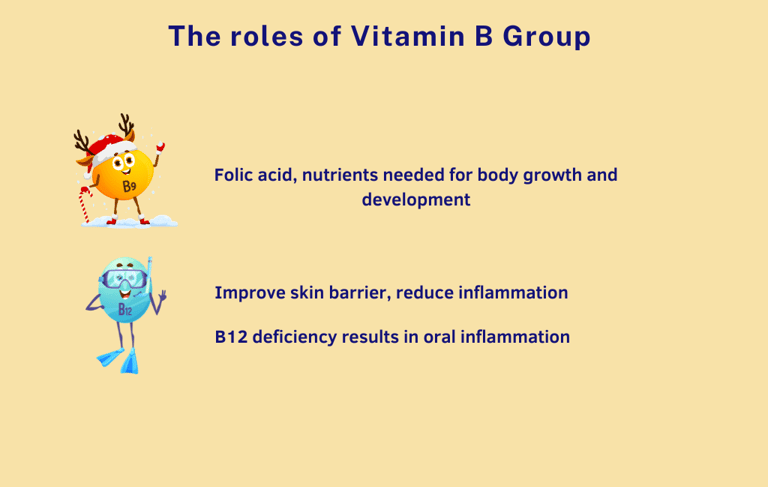

8. Folic acid is essential for a healthy baby
B9 vitamin, called folic acid, is a nutrient needed for body growth and development. The reason a mother should consume folic acid can also help prevent major birth defects in her baby's brain (anesthesia) and spine (bifurcation), the Centers for Disease Control and Prevention says.
The National Institutes of Health recommends that adolescents and adults take 400 mcg daily, but breastfeeding mothers should take 500 mcg per day and pregnant women should take 600 mcg per day.
Foods rich in folate are found in dark green leafy vegetables, asparagus, Brussels sprouts, oranges, nuts, beans, and peas. It can also be found in many fortified foods, such as cereals and bread.
It is very important for women who are pregnant or planning to become pregnant to get enough folic acid. As it provides essential nutrients for your baby's physical development, please consult with a medical professional before taking folic acid.
9. A lack of B vitamins can ruin your skin
According to the University of Rochester Medical Center, people with B12 deficiency may have pale or slightly yellow skin and visible whites of their eyes. (a condition known as jaundice).
In addition, B3 vitamin (niacin) has been shown to improve skin barrier function and reduce inflammation, which can help improve conditions such as acne, eczema, and rosacea. Niacinamide is one of the vitamins B3 (https://namu.wiki/w/%EB%B9%84%ED%83%80%EB%AF%BCB3)
that helps make keratin, a protein that maintains skin health. It has also been shown to reduce inflammation and make skin stronger, smoother, and brighter.
10. Mouth sores can occur if you are deficient in b vitamins
A lack of B vitamins can cause mouth pain and stomatitis. People who are deficient in B12 may develop a variety of symptoms, including mouth ulcers, due to the production of abnormally large red blood cells.
A 2021 study published in the Annals of Palliative Medicine looked at 16 previous studies (published between 2010 and 2021) involving B vitamins and mouth ulcers in more than 1,500 patients. The researchers analyzed the data to see if treatment with b vitamin complex had a positive effect on mouth ulcer healing. They found that b vitamin therapy helped accelerate the health of mouth ulcers and prevent their recurrence. A review of six studies comparing time to heal of ulcers found that, The scientists found that people who took B-complex supplements had an average of two days or more faster in ulcer healing time compared to the control group.
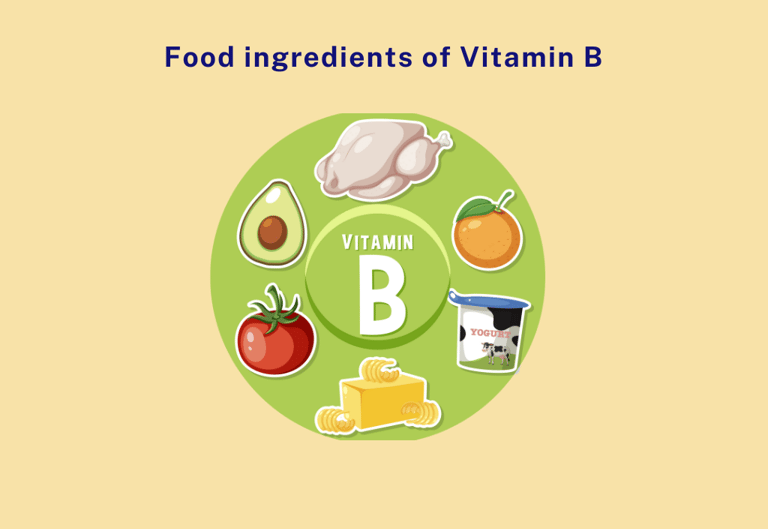

Getting B vitamins from food
You can get most of your daily intake of B vitamins from food. If you're looking to increase your B vitamin intake, check out our list of key B vitamin foods.
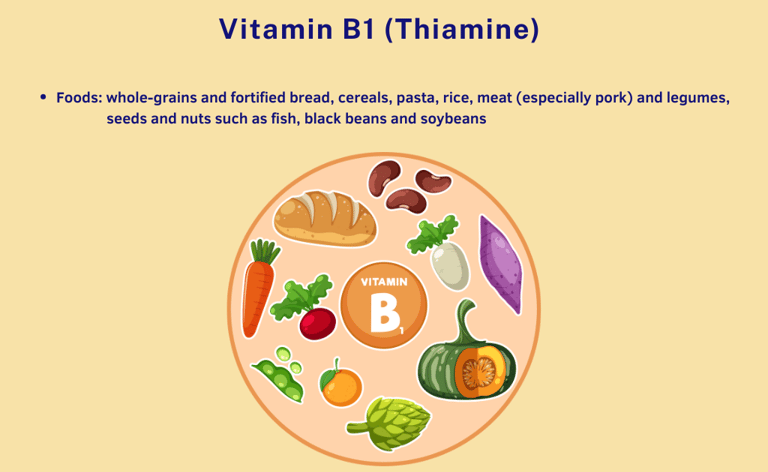

B1 vitamin (Thiamine)
Food: Whole grains and fortified breads, cereals, pasta, rice, meats (especially pork) and fish, legumes such as black beans and soybeans, seeds, and nutsWrite your text here...
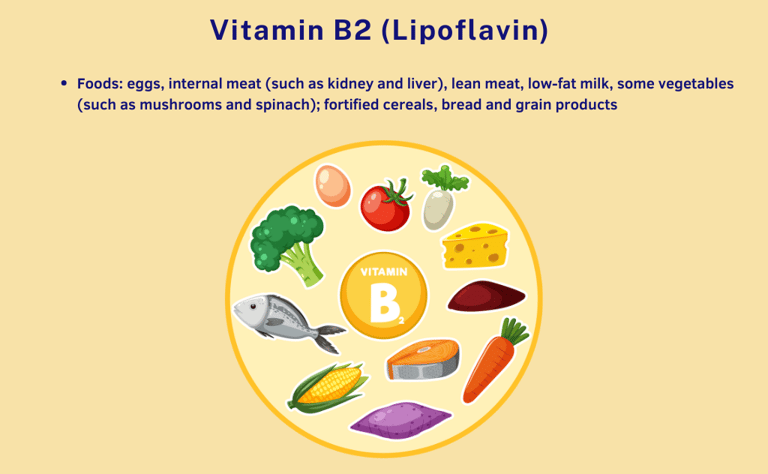

B2 vitamin (Riboflavin)
Food: eggs, organ meats (such as kidneys and liver), lean meats, low-fat milk, some vegetables (such as mushrooms and spinach); fortified cereals, breads and grain products.
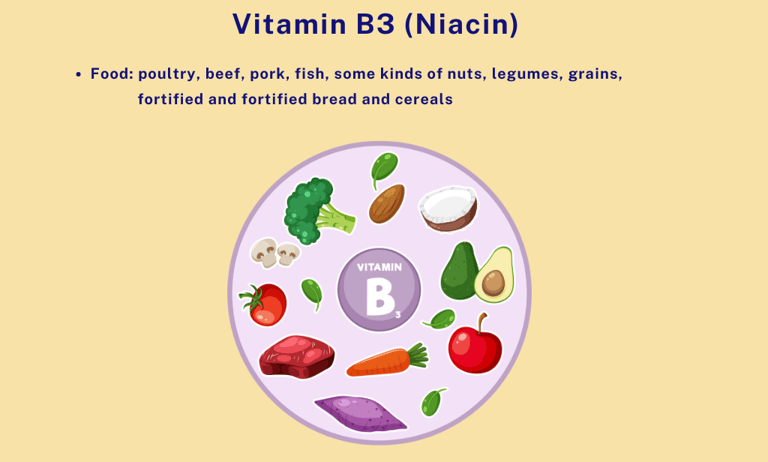

B3 vitamin (Niacin)
Food: Poultry, beef, pork, fish, some types of nuts, legumes, grains, fortified and fortified breads and cereals
B5 vitamin (Pantothenic Acid)
Food: beef, poultry, seafood and organ meats; eggs and milk; vegetables such as mushrooms (especially shiitake mushrooms), avocados, potatoes, and broccoli; whole wheat, brown rice, oats; peanuts, sunflower seeds, chickpeas
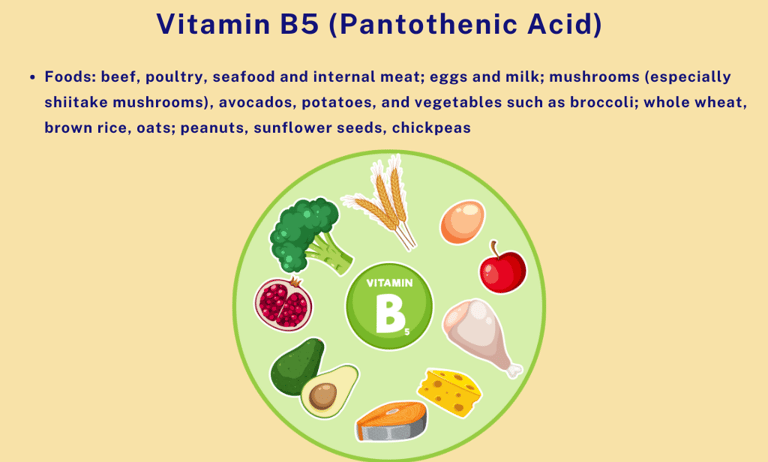

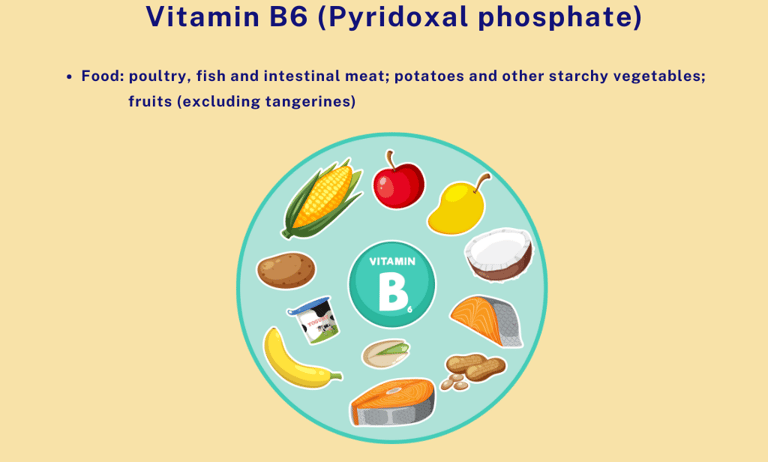

B7 (Biotin)
Foods: Meat, fish, eggs, organ meats (liver, etc.), seeds and nuts, certain vegetables (sweet potatoes, spinach, broccoli, etc.)
5. B2 may reduce migraines and improve vision
In addition to boosting your immune system, consuming enough riboflavin can help prevent migraines and cataracts.
"Some studies have shown that high doses of riboflavin supplements may help reduce the frequency and severity of migraines," Wick says. "In addition to B2, b vitamin12 and folic acid have also been shown to play an important role in preventing age-related macular degeneration, a leading cause of blindness in the elderly."
In a 2016 study published in the International Journal for Vitamin and Nutrition Research, researchers reviewed seven previous studies and found that in adults, taking B2 supplements may help reduce the frequency and duration of migraine attacks without significant side effects. The National Institute of Neurological Disorders and Stroke lists riboflavin as a possible natural treatment for migraines.
Riboflavin may also boost energy levels, boost the immune system, and treat acne, muscle cramps, and carpal tunnel syndrome.
6. Not enough B3 and B12 may be related to dementia
If you don't get enough niacin through your diet, you'll develop a condition known as pellagra. Pellagra is a systemic disease that affects the entire body because cells are deprived of the energy they need to perform their functions. Pellagra symptoms include physical and mental difficulties, diarrhea, inflammation of the mucous membranes, and dementia. Eventually, it affects the brain and nervous system, so it usually occurs in the elderly or alcoholics.
In the case of alcoholics, they suffer from pellagroid when their body cannot absorb enough niacin. In the case of niacin, it involves its use as a treatment to help control high cholesterol. If you are taking enough niacin to lower your cholesterol, you should consult your healthcare professional before taking it.
A deficiency of B12 also harms the nervous system and has been linked to dementia, depression, and confusion. A 2020 study published in the journal Cureus found that low levels of B12 can lead to poor cognition and memory, as well as poor myelination (the insulating layer or sheath that forms around nerves), which can lead to tingling and numbness. According to the survey, 202 adults with mild cognitive impairment were included. About 8 out of 10 people experienced noticeable improvement after taking b vitamin supplements.
"We are in favor of screening for b12 vitamin deficiency, at least in the elderly population, to find and prevent possible causes of this deficiency condition, as cognitive decline may be an easily preventable cause of impending dementia before it becomes irreversible," the authors concluded.
Ten years before the publication of this paper, an analysis in the journal Neurology of 271 people between the ages of 65 and 79 who did not have dementia at the start of the study found that blood B12 levels over a seven-year period were associated with a gradual decrease in the risk of developing Alzheimer's disease.
7. B vitamin5 may keep some hormones healthy
This type of B vitamin is necessary for the production of sex and stress-related hormones produced by the adrenal glands, which are small glands located above the kidneys. B5 is sometimes referred to as an "anti-stress vitamin" because it is thought to help regulate the production of the stress hormone cortisol. B vitamin5 is found in vegetables like broccoli, kale, and avocado, as well as whole-grain cereals, potatoes, dairy, and organ meats.
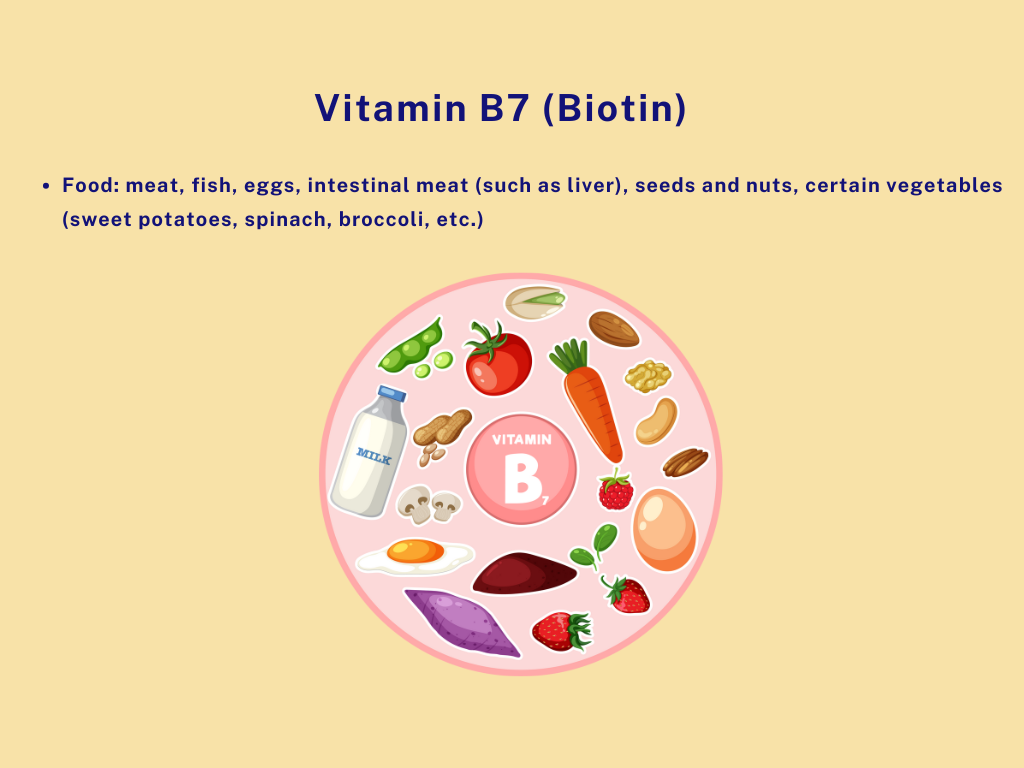

B5 vitamin (Pantothenic Acid)
Food: beef, poultry, seafood and organ meats; eggs and milk; vegetables such as mushrooms (especially shiitake mushrooms), avocados, potatoes, and broccoli; whole wheat, brown rice, oats; peanuts, sunflower seeds, chickpeas
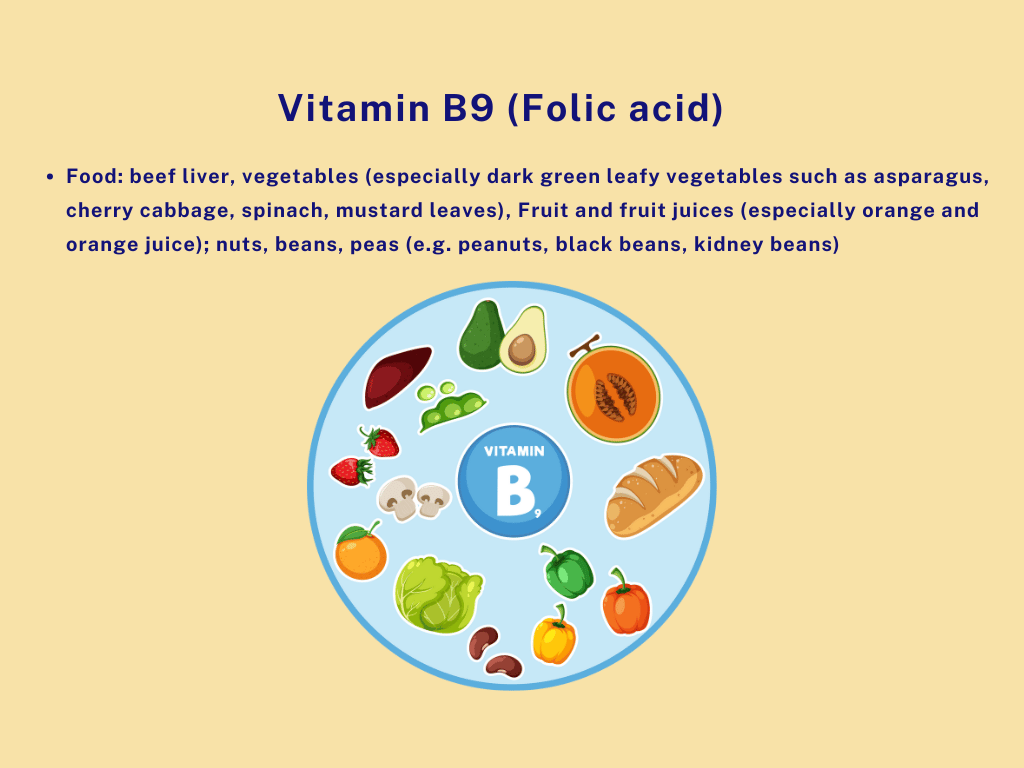

B9 (Folic Acid)
Food: beef liver, vegetables (especially dark green leafy vegetables such as asparagus, Brussels sprouts, spinach, and mustard greens), fruits and fruit juices (especially orange and orange juice); nuts, beans, and peas (e.g., peanuts, black beans, kidney beans)
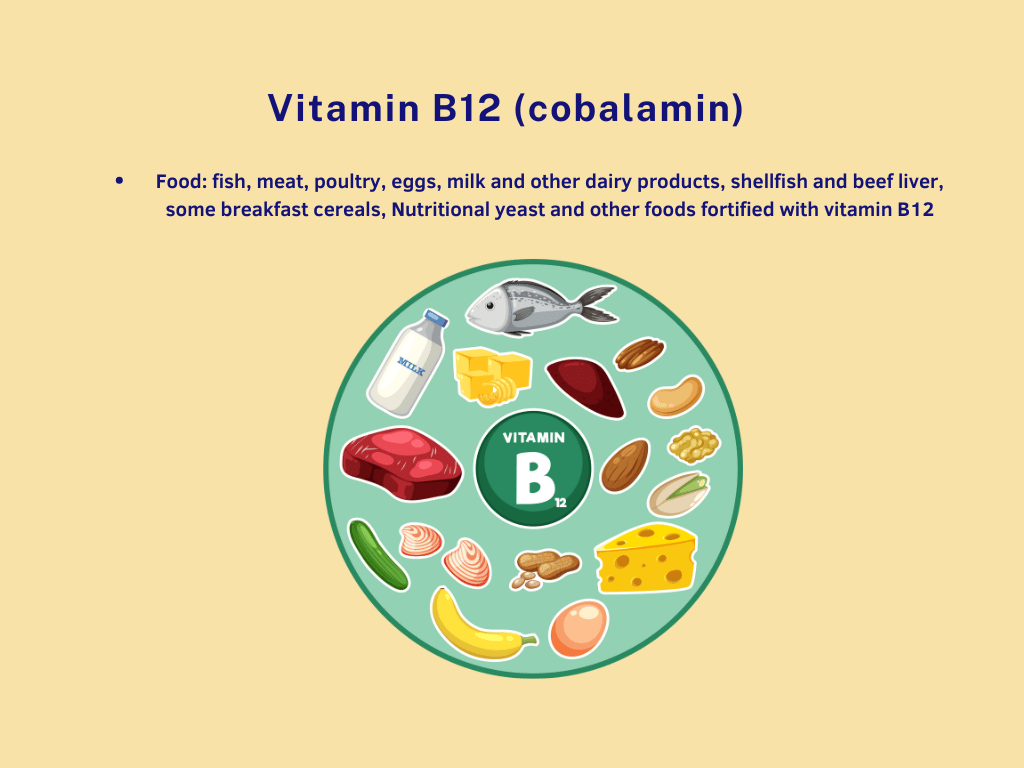

B12 (cobalamin)
Foods: Fish, meat, poultry, eggs, milk and other dairy products, shellfish and beef liver, some breakfast cereals, nutritional yeast and other foods fortified with b12 vitamin
In Conclusion
B vitamin have a variety of effects on the body, including the body's immune activity. Eight vitamin groups can be obtained through a balanced diet. If you suffer from a specific disease caused by a deficiency of B vitamins, you should consult with a medical professional before taking it with a prescription to ensure that you can take it safely.
Especially for the elderly, b vitamin5 prevents dementia and anemia, so taking it can help them maintain an active lifestyle. In addition, b vitamin2 has been shown to improve vision and reduce the frequency and severity of migraines.B12 also has a number of health benefits, including its role in the formation of blood cells and the maintenance of good health.
As such, you can get enough B vitamins through a balanced diet as well as supplements. The whole grains are rich in B1, meat and poultry are good sources of B3 and B5, and dark leafy vegetables are high in B9.
